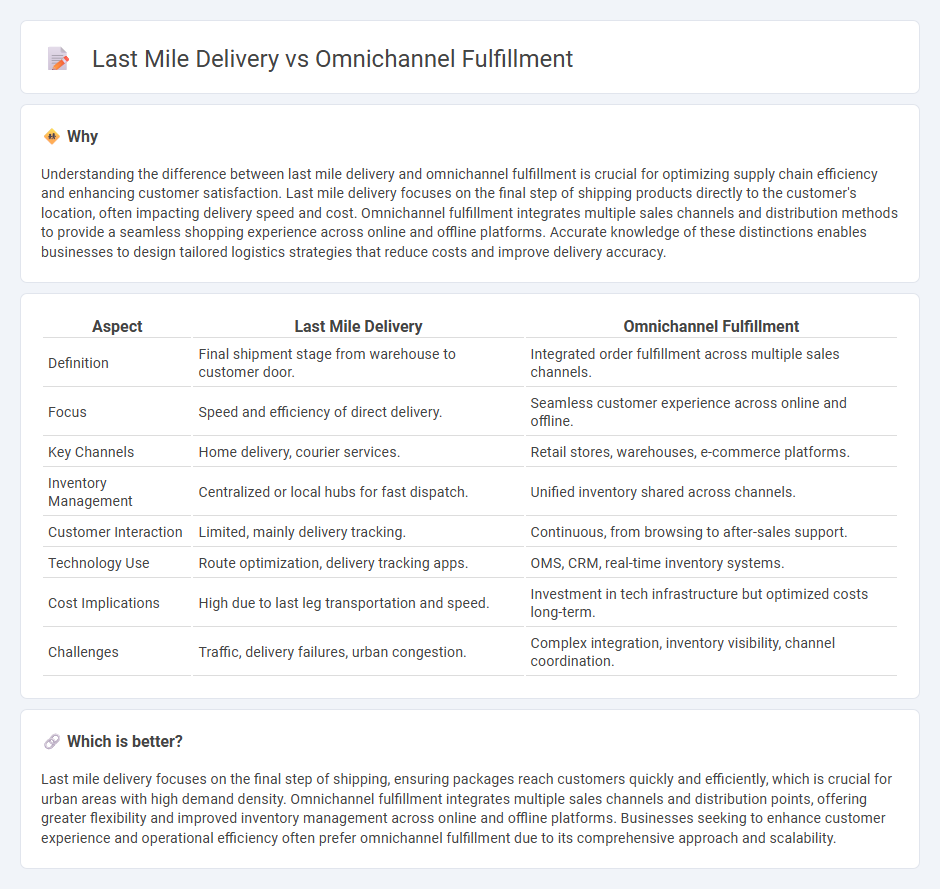
Last mile delivery focuses on transporting goods from a distribution center to the final customer, emphasizing speed and efficiency in urban and suburban areas. Omnichannel fulfillment integrates multiple sales channels, coordinating inventory and shipments to provide a seamless customer experience across online, in-store, and mobile platforms. Discover how optimizing these logistics strategies can enhance supply chain performance and customer satisfaction.
Why it is important
Understanding the difference between last mile delivery and omnichannel fulfillment is crucial for optimizing supply chain efficiency and enhancing customer satisfaction. Last mile delivery focuses on the final step of shipping products directly to the customer's location, often impacting delivery speed and cost. Omnichannel fulfillment integrates multiple sales channels and distribution methods to provide a seamless shopping experience across online and offline platforms. Accurate knowledge of these distinctions enables businesses to design tailored logistics strategies that reduce costs and improve delivery accuracy.
Comparison Table
| Aspect | Last Mile Delivery | Omnichannel Fulfillment |
|---|---|---|
| Definition | Final shipment stage from warehouse to customer door. | Integrated order fulfillment across multiple sales channels. |
| Focus | Speed and efficiency of direct delivery. | Seamless customer experience across online and offline. |
| Key Channels | Home delivery, courier services. | Retail stores, warehouses, e-commerce platforms. |
| Inventory Management | Centralized or local hubs for fast dispatch. | Unified inventory shared across channels. |
| Customer Interaction | Limited, mainly delivery tracking. | Continuous, from browsing to after-sales support. |
| Technology Use | Route optimization, delivery tracking apps. | OMS, CRM, real-time inventory systems. |
| Cost Implications | High due to last leg transportation and speed. | Investment in tech infrastructure but optimized costs long-term. |
| Challenges | Traffic, delivery failures, urban congestion. | Complex integration, inventory visibility, channel coordination. |
Which is better?
Last mile delivery focuses on the final step of shipping, ensuring packages reach customers quickly and efficiently, which is crucial for urban areas with high demand density. Omnichannel fulfillment integrates multiple sales channels and distribution points, offering greater flexibility and improved inventory management across online and offline platforms. Businesses seeking to enhance customer experience and operational efficiency often prefer omnichannel fulfillment due to its comprehensive approach and scalability.
Connection
Last mile delivery and omnichannel fulfillment are interconnected through their focus on providing seamless, efficient customer experiences by integrating multiple sales channels with speedy, accurate final parcel delivery. Omnichannel fulfillment relies on real-time inventory visibility and flexible delivery options, which directly enhance last mile delivery efficiency by optimizing route planning and reducing delivery time. This synergy drives customer satisfaction and operational cost savings in modern logistics networks.
Key Terms
**Omnichannel Fulfillment:**
Omnichannel fulfillment integrates inventory management, order processing, and shipping across multiple sales channels to provide a seamless customer experience. It leverages advanced technologies like real-time inventory tracking, automated warehouses, and data analytics to optimize supply chain efficiency and reduce delivery times. Explore how omnichannel fulfillment transforms retail operations and enhances customer satisfaction.
Inventory Visibility
Omnichannel fulfillment integrates inventory visibility across all sales channels, allowing real-time tracking and efficient stock allocation to meet customer demand. Last mile delivery focuses on the final step of order fulfillment, emphasizing timely and accurate delivery but relies heavily on accurate inventory data beforehand. Explore how enhancing inventory visibility can optimize both omnichannel fulfillment and last mile delivery processes.
Order Orchestration
Order orchestration in omnichannel fulfillment integrates inventory management, order processing, and shipping across multiple sales channels to optimize delivery speed and customer experience. Last mile delivery specifically addresses the final step of order fulfillment, ensuring packages reach the consumer efficiently, often influenced by real-time routing and carrier selection. Explore how advanced order orchestration strategies enhance both omnichannel fulfillment and last mile delivery for superior operational performance.
Source and External Links
What is Omnichannel Fulfilment? Meaning, Strategies, & Example - Omnichannel fulfillment is a centralized order management strategy that synchronizes inventory and order processing across all sales channels, enabling options like buy online, pick up in-store (BOPIS).
What Is Omnichannel Fulfillment? - Omnichannel fulfillment unifies all inventory and fulfillment processes, allowing retailers to fulfill orders from any location regardless of where the sale originated.
The strength of an omnichannel fulfilment strategy - This approach lets businesses meet diverse customer demands--such as fast delivery, in-store pickup, or cross-channel returns--by breaking down barriers between sales and fulfillment channels.
 dowidth.com
dowidth.com